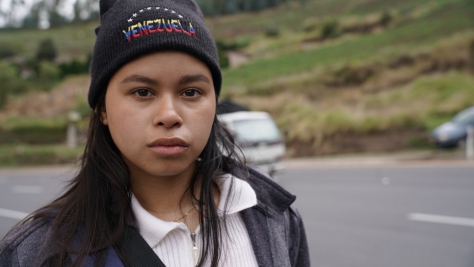Violence in northern Mali forces over 20,000 into exile
This is a summary of what was said by UNHCR spokesperson Adrian Edwards – to whom quoted text may be attributed – at today's press briefing at the Palais des Nations in Geneva.
UNHCR has deployed emergency teams to countries surrounding Mali to help meet the needs of some 20,000 people who have been forced to flee fighting in northern Mali. Most of the displaced are in Niger, Burkina Faso and Mauritania.
Fighting between rebel Tuareg groups and governmental forces in the Azawad region of northern Mali began in mid-January.
In the past three weeks, at least 10,000 people are reported to have crossed to Niger, 9,000 have found refuge in Mauritania and 3,000 in Burkina Faso.
In Niger, most of the new arrivals are from Menaka in Mali. Some have settled very close to the volatile border. Many of the new arrivals are sleeping in the open and have little access to shelter, clean water, health services, and food. People are scattered mainly in villages in Tillaberery, Ouallam, and Filingue districts, in the north of the country. Sinegodar, a village in Tillabery district, is hosting over 5,500 Malians, with one sole water point for the entire refugee and local population.
While most of those who recently fled Mali are Malians, recent arrivals in Niger also include nationals of Niger who had been living in Mali for decades. Many have been crossing the border between the two countries regularly to find grazing land for their cattle.
Local communities along the border, affected by the food crisis themselves in the Sahel, are sharing their resources with the new arrivals. The authorities have also distributed food. Four additional UNHCR staff are already in Niger and more are on their way. We plan to send aid for 10,000 people from our stockpiles in the region.
Our office in Ouagadougou, in Burkina Faso also reported the arrival of some 3,000 Malian Tuaregs following attacks on their homes and businesses in the Malian capital Bamako and in the nearby town of Kati last week. Many of the new arrivals are staying with host families in Ouagadougou and Bobo Dioulasso, 320 kilometres south-west of the capital. Other new arrivals have been reported in the north west of the country, especially near Djibo, in Soum province. An inter-agency mission, including UNHCR, is scheduled to go there by the end of the week to assess the needs of the people.
Meanwhile in Mauritania UNHCR has sent several missions to the village of Fassala, in the region of Hodh el Chargi 3km from the border with Mali, where over 9,000 people have arrived since 25th January. The mainly ethnic Tuareg Malian refugees come from the region of Léré on the other side of the border. They told UNHCR that they fled fighting between Government forces and rebel Tuareg fighters, fearing retaliation by army troops.
The Mauritanian authorities, with the support of UNHCR, are taking care of the new arrivals. Medical services are being offered by the local health clinics and water is being trucked in by the authorities. UNHCR Mauritania distributed 15-day food rations and non food items to cover the urgent needs of 5000 refugees in the refugee site of Fassala. Key needs identified are food, shelter and other basic items. UNHCR will strengthen its presence in Mauritania by fielding an emergency support team.
Fighting between the Tuareg liberation movement MNLA (Mouvement National de Liberation de l'Azawad) and governmental forces resumed on 17 January in Mali, breaking a 2009 agreement that had officially ended the Tuareg rebellion.
For further information on this topic, please contact:
- In Dakar: Helene Caux on mobile +221 77 333 12 91
- In Geneva: Fatoumata Lejeune-Kaba on mobile +41 79 249 3483
- In Geneva: Sybella Wilkes on mobile +41 79 557 9138
Related news and stories
Violence and threats by armed groups continue to displace refugees and civilians in Mali
Escalating violence leaves hundreds dead and hundreds of thousands on the move in eastern DRC
UNHCR urges greater support as violence continues unabated in Burkina Faso
Displaced people from climate frontlines raise their voices at COP27
UN warns of worsening conflict and displacement in Sahel without immediate climate action
UNHCR calls on States to refrain from forced returns of Haitians
-

30 March 2022 Agenda - Informal briefing on the Global Compact on Refugees
25 Mar 2022 Agenda for the first virtual quarterly informal briefing on the Global Compact on Refugees held virtually on Wednesday, 30 March 2022, 15:00-17:00 hours CET -

A month since the start of the war, almost a quarter of Ukraine's population are displaced
25 Mar 2022 -

High Level Officials Meeting 2021 Outcome Document
25 Mar 2022 This is the Outcome Document for the High-Level Officials Meeting, held on 14 and 15 December 2021. -

Roadmap to the Global Refugee Forum in 2023
25 Mar 2022 Roadmap to the next Global Refugee Forum that will be held in 2023 under the Global Compact on Refugees. -

Summary of Key Recommendations and Follow-Up Actions from the 2021 High-Level Officials Meeting
25 Mar 2022 Twenty key recommendations for the future were identified as a part of the stocktaking in the lead-up to and during the High-Level Officials Meeting (HLOM) in 2021. -

Résumé des principales recommandations et des mesures de suivi - Réunion de hauts responsables de 2021
25 Mar 2022 Lors de la préparation et de la tenue de la Réunion de hauts responsables, vingt principales recommandations pour l'avenir ont été identifiées dans le cadre des opérations d'évaluation. -

UNHCR and the European Union launch 360-degree interactive film on Venezuelan displacement in Ecuador
24 Mar 2022 -

News comment: Without international solidarity, Ukraine's displacement crisis could turn into catastrophe
24 Mar 2022 Statement by UN High Commissioner for Refugees Filippo Grandi -

UNHCR partners with FC Barcelona to bring the power of sport to displaced children
24 Mar 2022
